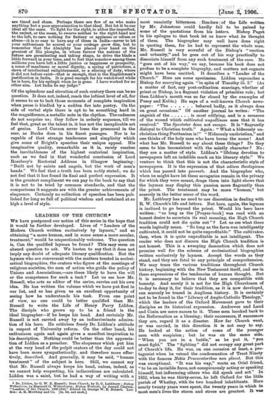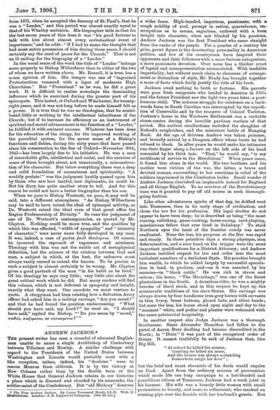LEADERS OF THE CHURCH.*
WE have postponed our notice of this series in the hope that it would be further developed. Lives of " Leaders of the Modern Church written exclusively by laymen," and so obtaining "a more human, and in some sense a more secular, treatment," would be unquestionably welcome. The question is, Can the qualified layman be found ? This may seem an absurd question to ask. We hasten to say that it does not imply any doubt of adequate literary qualification. But the laymen who are conversant with the matters treated in ecclesi- astical biographies, the orators who figure at the meetings of religious societies, the men of action who guide the policy of Unions and Associations,—are these likely to have the will or the competence for such a task ? Let us see how Mr. Russell, who acts as editor of the series, carries out his own idea. He has written the volume which we have put first in our list, and so has given us an excellent opportunity of seeing how he understands his task. From one point of view, no one could be better qualified than Mr. Russell to write the Life of Henry Parry Liddon. The disciple who grows up to be a friend is the ideal biographer—if he keeps his head. And certainly Mr. Russell is not carried away by an indiscriminate admira- tion of his hero. He criticises freely Dr. Liddon's attitude in respect of University reform. On the other hand, his enthusiasm again and again gives a manifest inspiration to his description. Nothing could be better than the apprecia- tion of Liddon as a preacher. The eloquence which put him at the very head of the pulpit orators of the day could not have been more sympathetically, and therefore more effec- tively, described. And generally, it may be said, " human treatment " of the subject is here. Still, we cannot say that Mr. Russell always keeps his head, unless, indeed, as we cannot help suspecting, his indiscretions are calculated. Liddon was a saint, but he had a way of writing with a • Dr. Liddon, by G. W. E. Russell; Dean Church, by D. C. Lathbury ; Bishop Wilberforce, by Reginald G. Wilberforce; Bishop Westcott, by Joseph Clayton. " Lftders of the Church, 1800-1906," Edited by George W. E. Russell. Lon- don : A. R. Mowbray and Co. [3s. 6d. net each.] most unsaintly bitterness. Readers of the Life written by Mr. Johnstone could hardly fail to be pained by
some of the quotations from his letters. Bishop Paget in his epilogue to that book let us know what he thought of them. The biographer may well have done right in quoting them, for he had to represent the whole man.
Mr. Russell is very scornful of the Bishop's "unction and urbanity," and he goes out of his way practically to dissociate himself from any such treatment of the case. He " goes out of his way," we say, because his book does not profess to be a complete biography, and matters not cognate might have been omitted. It describes a " Leader of the Church." Here are some specimens. Liddon reproaches a Bishop for marrying again "in spite of Timothy iii. 2." (As a matter of fact, any post-ordination marriage, whether of priest or Bishop, is a flagrant violation of primitive rule ; but then Liddon's mouth was so far closed by the examples of Pusey and Keble.) He says of a well-known Church news- paper : "The behaved badly, as it always does on great occasions." Of another journal he writes : " The
anguish of the is most edifying, and is a measure of the wound which cultivated ungodliness sees that it has received." The Spectator does not escape. It is "flagrantly disloyal to Christian truth." Again : " What a hideously un- christian thing Puritanism is !" " Hideously unchristian," and one thinks of the holy men who have borne the name ! And what has Mr. Russell to say about these things ? Do they seem to him inconsistent with the saintly character ? No : they are a matter of style. Liddon's "lifelong devotion to newspapers left an indelible mark on his literary style." We venture to think that this is not the characteristic style of newspapers. It is the expression of that odium, theologicum which has passed into proverb. And the biographer who, when he might have let these savageries remain in the privacy for which they were meant, drags them into light shows that the layman may display this passion more flagrantly than the priest. The treatment may be more "human," but scarcely in the better sense of the word.
Mr. Lathbury has no need to use discretion in dealing with R. W. Church's life and letters. But here, again, the layman is inclined to go beyond the priest. Would his hero have written : " so long as the [Prayer-book] was read with an honest desire to ascertain its real meaning, the High Church tradition could not die quite out " ? Let us see what these words logically mean. " So long as the farm was intelligently cultivated, it could not be quite unprofitable." The cultivator, then, when it is quite unprofitable is not intelligent. The reader who does not discern the High Church tradition is not honest. This is a sweeping damnation which does not promise well for the scheme of ecclesiastical biographies written exclusively by laymen. Accept the words as they stand, and they are fatal to any principle of comprehension. We may trace the various traditions throughout Church history, beginning with the New Testament itself, and see in them expressions of the tendencies of human thought. But it is necessary to believe that they are compatible with honesty. And surely it is not for the High Churchmen of to-day to deny it, for their tradition, as it is now developed, can scarcely be traced in Anglican history. It is certainly not to be found in the " Library of Anglo-Catholic Theology," which the leaders of the Oxford Movement gave to their disciples as its historical expression. Andrewes and Laud and Cosin are mere names to it. These men l000ked back to the Reformation as a blessing ; their successors, if successors they are, regard it as a disaster. How far Church went, or was carried, in this direction it is not easy to say. He looked at the action of some of the younger men with suspicion ; but he was on the same side. " When you are in a battle," as he put it, "you must fight." The " fighting " did not occupy any great part of Church's life. He was, on one occasion at least, a pro- tagonist when he vetoed the condemnation of Tract Ninety with the famous Nobis Procuratoribus non placet. But this was exceptional. "It was his way," wrote an Oriel friend, " to be an invisible force, not conspicuously acting or speaking himself, but influencing others who did speak and act." In 1852, when he was thirty-seven, he left Oxford for the little parish of Whatley, with its two hundred inhabitants. Here nearly twenty years were spent, the twenty years in which in most men's lives the storm and stress are greatest. It was
from 1871, when he accepted the deanery of St. Paul's, that he was a "Leader," and this period was almost exactly equal to that of his Whatley seclusion. His biographer tells us that for the last seven years of this time it was " his good fortune to talk with him about almost every ecclesiastical event of importance," and he adds : " if I had to name the thought that had most entire possession of him during those years, I should certainly say the need of peace for the Church." That is not an ill ending for the biography of a " Leader."
In the usual sense of the word the title of "Leader" belongs more properly to Bishop Wilberforce than to either of the two of whom we have written above. Mr. Russell, it is true, has a mean opinion of him. His temper was one of "ingrained Protestantism veneered with a layer of moderate High Churchism." But "Protestant" as he was, he did a great work. It is difficult to realise nowadays the dominating influence which he exercised during the greater part of his episcopate. This lasted, at Oxford and Winchester, for twenty- eight years, and it was not long before he made himself felt as a power. It is true that he was no theologian, that he contri- buted little or nothing to the intellectual inheritance of the Church; but if to increase its efficiency as an instrument of spiritual and moral advancement is the function of a "Leader," he fulfilled it with eminent success. Whatever has been done for the education of the clergy, for the improved working of the parochial system, for the newer sense of a Bishop's functions and duties, during the sixty years that have passed since his consecration to the See of Oxford—November 30th, 1845—has been largely due to his initiative. He was a man of remarkable gifts, intellectual and social, and the exercise of some of these brought about, not unnaturally, a misconstruc- tion of his character. But below everything there was a deep and solid foundation of earnestness and spirituality. " A worldly prelate !" was the judgment hastily passed upon him by those who saw how tactful, how diplomatic, he could be. But his diary has quite another story to tell. And for this reason he could not have a better biographer than his son.
When we pass to Bishop Westcott, we pass, it may well be said, into a different atmosphere. "As Bishop Wilberforce may be 'said to have raised the ideal of episcopal activity, so Dr. Westcott raised the ideal even of that great office the Regius Professorship of Divinity." So runs the judgment of one of Dr. Westcott's contemporaries, as quoted by Mr. Clayton. Nothing could be more true, and the qualities by which this was effected, " width of sympathy " and " intensity of character," were never more fully developed in any man. It was, indeed, a case of pectus facit theologum. Of course, he incurred the reproach of vagueness and mistiness. Theology with him was not the subtle art of metaphysical definition, but the science of the relation between God and man, a subject in which, at the best, the unknown must always vastly exceed in extent the known. To be precise in such a subject is almost certainly to be wrong. Mr. Clayton gives a good portrait of the man "in his habit as he lived." Of his theology he says very little ; very little also about the great critical work which he did. But many readers will find this volume, which is not deficient in sympathy and insight, exactly what they want. One anecdote we must venture to quote. A clergyman had been relating how a Salvation Army officer had asked him in a railway carriage, "Are you saved ? " and that he had found the question embarrassing. "What should you have said, my Lord ? " he went on. "I should have said," replied the Bishop, "e Do you mean by "saved," mallets, creotOpevos, or crEcrouraivor ?' "







































 Previous page
Previous page